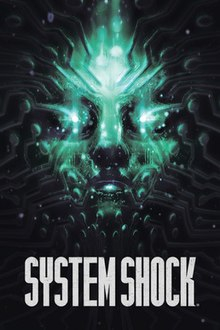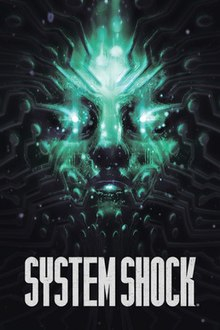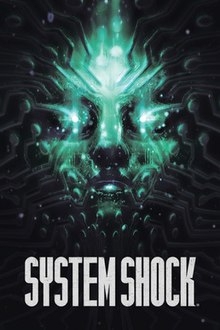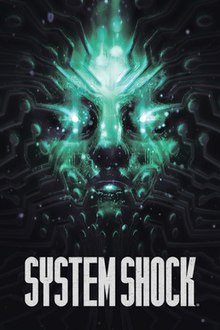
System Shock (PC) - Review
by Paul Broussard , posted on 30 June 2023 / 2,617 ViewsGetting older is a collective realization of two things: first off, that you definitely aren’t as good at a lot of things as you used to be (mostly athletic), and secondly that the things you used to enjoy definitely weren’t as good as they used to be. Nostalgia is a hell of a drug, causing us to remember movies, TV shows, and, yes, games much more fondly than we probably should have.
On a completely unrelated note, here’s the System Shock remake. The original System Shock is probably one of the most influential titles of the mid 1990s, and that’s saying quite a lot. It’s also a game I have fond memories of playing as a kid (albeit with a good chunk of help from some friends), and jumping into the remake now I was curious whether it would hold up today, or whether it would prove to be another game from my past buoyed by rose tinted glasses.
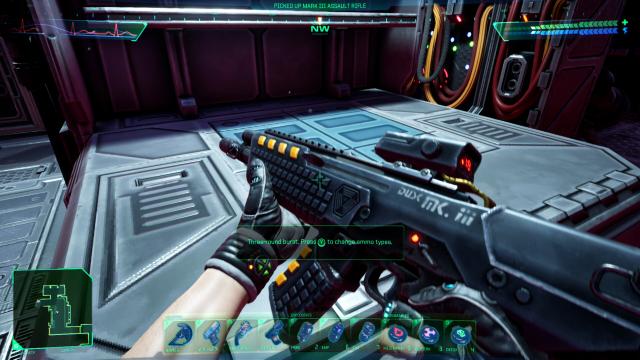
The initial plot of System Shock doesn’t take long to get started. It’s half past the future and we play as a standard silent protagonist with generic hacking skills. Unfortunately, said hacking skills aren’t quite as good as we hoped, and as a result we get arrested for breaking into an important person’s stuff. We’re whisked away to a space station, where a mustache twirlingly evil man offers us freedom and even more leet hacking skills in exchange for disabling the station AI’s ethics protocols. With obviously no downside to this agreement, our hero readily complies and undergoes the surgery to get his new uber hax0r skills. Unfortunately, we weren’t smart enough to schedule the surgery on a location that isn’t the space station now being run by a rampant amoral AI, and so when we wake up we find a bunch of corpses, an army of zombies and unfriendly cyborgs, and a particularly sassy computer who isn’t especially grateful to us for her newfound freedom.
System Shock is very much a Ken Levine title through and through. If you’re like me and happened to be three months old at the time of the original System Shock’s release, then BioShock is unsurprisingly a pretty good point of comparison. If you haven’t played BioShock either (which I was originally going to write something sarcastic about but then I realized it’s somehow 16 years old now, so I guess it's actually pretty reasonable to have not played it), then the best recent comparison I can come up with is 2017’s Prey. You’re trapped on a space station, constantly being harassed by an unfriendly AI and her minions, and slowly unlocking more and more of the station as you explore.
Much of the appeal of System Shock lies in soaking up the horror-esque atmosphere of a dead space station, seeing the chaos it has devolved into and piecing together events. There are some truly horrifying spectacles on display, which does a lot to make the game’s backstory feel like a tragedy that was really carried out. Citadel Station feels lonely, gloomy, and oppressive, with no one to offer you comfort but hostile NPCs and a cackling AI voice over the intercom. It's surprising how effectively the early game can jump scare you without even really trying; simply by having an enemy right around a corner or some such.
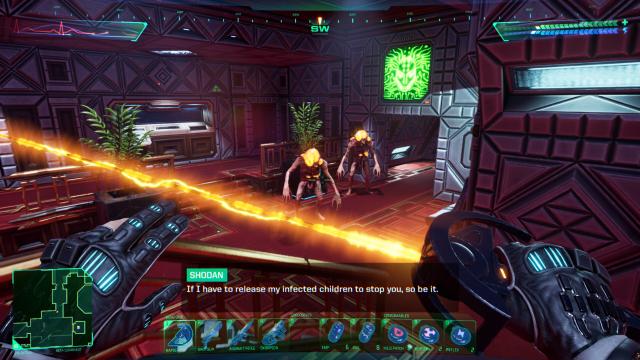
Speaking of which, that AI is worth a deep dive of her own, especially given how prevalent she is in the game’s art and marketing. Shodan is the antagonistic artificial intelligence of Citadel Station and primary antagonist throughout your adventure. She does the Handsome Jack thing where she’ll call you up every so often to tell you how much you suck, but she also leaves audio logs around, which range from reminding you how great she is to actually shedding some interesting insight into her thought process. The audio logs all have this rather generic sounding voice filter, where she glitches in and out and repeats words sometimes, which I think winds up doing more harm than good for the character. Perhaps this sounds like a nitpick, but I think for a game relying on atmosphere, it’s important to have the imposing character sound imposing, and not have a voice that sounds like it was grabbed from a random soundboard of robot noises. If that still sounds nitpicky, imagine an action title or shooter using that generic 1970s Hollywood scream every time an enemy died; it would make the story a lot harder to take seriously.
The lore feeds heavily into that atmosphere, as you stumble upon audio and text logs that reveal a little about what happened. Having said that, I feel like BioShock handled this slightly better by not effectively giving away the big reveal at the start. If we see ourselves turn an almost omnipotent AI’s ethical restraints off, and then wake up a while later to see chaos all around, it’s not exactly much of a surprise as to what happened. There’s no real mystery left for us to discover, which just leaves the game with some worldbuilding tidbits and descriptions of individual people’s deaths as the only notable story elements to really stumble upon.
Level design is one of the strongest points of the title, with sprawling open areas on each floor that loop back in on each other nicely. There are lots of shortcuts that allow for easy access between earlier and later areas within the same floor, and quite a good bit of verticality as well. The title I’m reminded the most by here is Bloodborne, of all things, given just how expansive the corridors are and how they all inevitably tie back into each other to create a seamless level. For a nearly 30 year old title now (and I absolutely hate writing that as it reflects on me as well), it has a lot to teach modern games in terms of designing areas to explore.
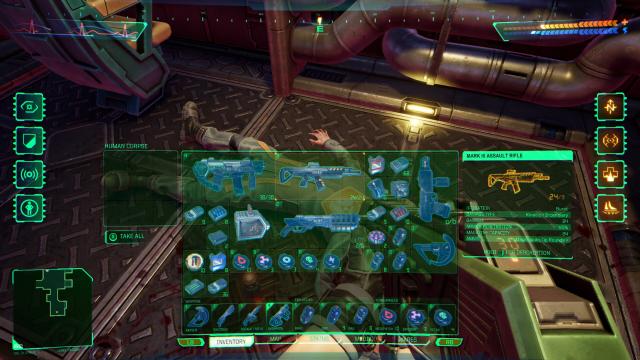
Unfortunately System Shock starts to show its cracks when it comes to pretty much anything besides walking around and soaking in the atmosphere. Let’s start with what I imagine will be most people’s biggest complaint: information. I understand the desire to preserve the spirit of an old title and not make unnecessary changes, but I think there’s room for a couple of quality-of-life changes to make finding crucial items more convenient. Those aforementioned text and audio logs don’t purely focus on story elements; they often contain plot-vital tasks and instructions for what to do next, and if you happen to miss one you can find yourself very confused on where to go next. The game also has a rather annoying habit of leaving out rather important details on what you should be doing until much later, which necessitates a lot of annoying backtracking and busywork later on. I’m going to put this here for future players because I guarantee it will improve your experience: keep track of the random numbers that appear after clearing the final room on each floor. They’re needed for an end-game quest and if you haven’t been doing it you'll need to backtrack the entire station to get them.
While the navigation side of things arguably provides too little assistance, survivability goes in the opposite direction and provides far too much. Combat is (at its best), serviceable, and it's quite frequently not even that. Your character maneuvers like they’re stuck to a roomba and enemies aim with extreme precision, so you'll probably die a decent amount while getting used to things. The developers wisely recognized this and implemented a solution to avoid player frustration, which is good - it’s just that the solution they came up with is absolutely stupid. Essentially, the game’s answer to frequent player death is to just… basically let you opt to not die. There are a variety of respawn stations throughout the station, and unlocking them means that when your health reaches zero, you revive there instead of getting a game over. And outside of the walk you have to make back to the room where you were previously, you lose literally nothing. There’s no penalty in terms of currency, or resources, or progress; heck, you can walk right back to where you were and the enemies you were fighting will still have the exact same health when you died, so you can win basically any non-boss battle by pure attrition if you’re stubborn enough, regardless of your equipment.
If there’s anything that sucks the life out of a tense, oppressive atmosphere, it’s knowing that the worst fate that can await your character is having to take a long stroll. With no significant penalty like a loss of resources or progress, and the game actively depicting you as capable of perpetually resurrecting in its story, the station loses much of its imposing nature. It also makes Shodan look like a complete idiot and makes her even harder to take seriously. One would think that after the fifth or so time of seeing our character resurrect, she might make it a priority to destroy the revive stations.
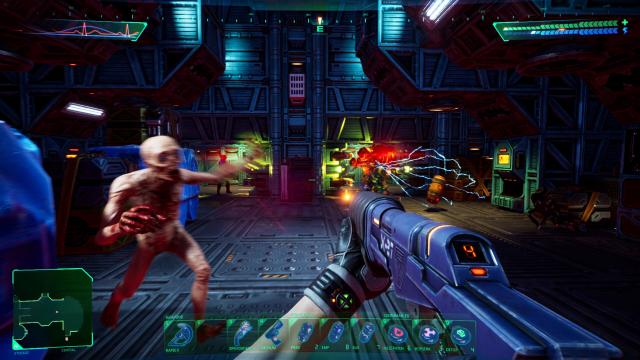
Admittedly, this has always been a problem in Ken Levine titles, and so it's perhaps unexpected here. And while I would argue BioShock and its sequels suffered from it, I think they at least weren't as badly hit because they were far more focused on telling a story rather than creating a certain gameplay atmosphere. A more narrative-driven game can afford hiccups that cut into the tension of the moment to moment gameplay, because at the end of the day that’s not really what we’re there for. System Shock’s atmosphere is what we’re here for, however, and as a result anything that pokes a massive gaping hole in it is a massive gaping problem.
This is even worse than the original too, which at least had some tension in that you could only respawn if you had found the station on the floor that you were exploring when you died. If you died on a floor without the recharge station unlocked, you would instead receive a game over. This made the initial segments of exploring a new floor actually pretty tense, and incentivized finding that station as soon as possible. In the remake, after you stumble and unlock the first respawn station, “dying” is effectively relegated to a minor nuisance rather than a genuine fail-state.
There are a few other notable complaints I’ll throw out. Enemy AI is very simplistic still and seems to function largely the same across about 75% of enemy types, which makes the combat pretty repetitive. It has a rather annoying habit of respawning enemies in places that are frankly just flat out unfair, including directly behind you or right in front of an elevator exit. The music, or general lack thereof, is a bummer too; immersive titles like this stand to benefit heavily from a soundtrack that gets the player in the mood, but System Shock has very little background music at all, and when it does show up it's usually some generic action theme for combat. There are also some technical issues as well in this regard, with enemies sometimes clipping through walls, framerate problems, and corpses bugging out hilariously, which all provide a hit to the good ol’ immersion factor.
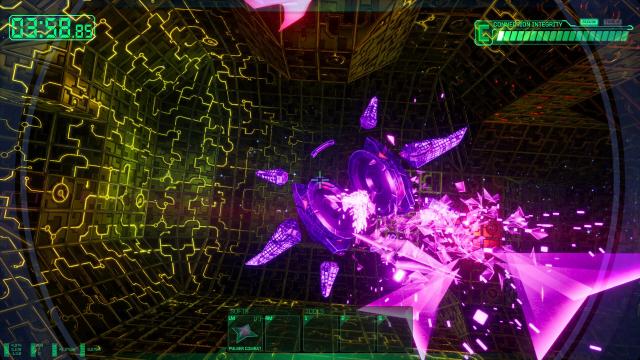
While we’re on the subject of changes, let’s go over some of the other ways in which the remake differs from the original. In general it’s a pretty faithful adaptation of the original, but there are a few differences. The graphics are obviously much improved, and the lighting seems to be a bit darker as well, which does help support the horror mood. There’s a new system where you can “vaporize” random junk you pick up to earn credits for purchasing items like health and ammo, which isn't especially interesting but is a nice way to at least reward the player for hoarding things. The heads-up display is now much more streamlined as well, which is very much appreciated given how busy it was in both of the original System Shock titles.
The biggest improvement, however, is found in the cyberspace segments, which have improved significantly from being downright miserable to play through to merely bad. There are a variety of opportunities throughout the game to hack things, and this is done by having you play a flight sim through a psychedelic background for 3 minutes. And it still absolutely sucks. I appreciate the desire to find an inventive way to represent standard hacking skills, but . At least you can actually see where you’re going now; the original title placed everything on wireframe backdrops which made distinguishing where just about anything was an absolute chore.
One final change I’ll give the remake props for is the wealth of difficulty settings, letting the player fine tune challenge across a variety of areas. You can decide independently how difficult combat, hacking, puzzles, and navigation are, although at least one of the settings doesn’t appear to work as of two weeks after release, so I’m not sure how much credit I should be giving here. At the very least, though, it is nice to see a title let players customise individual aspects of gameplay like this to some degree; I’d argue that more games which demand multiple skill sets of players should do this.
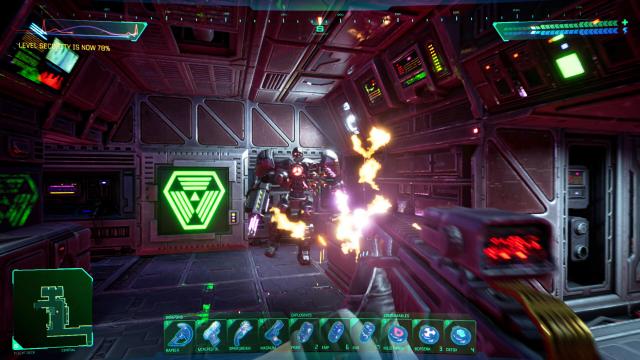
That said, there are a number of negative changes too, even beyond the aforementioned changes to the respawn room. You can no longer write notes on your map, which was frankly one of the best quality-of-life inclusions in the original System Shock. Being able to make your own notes and write down specifically where things were was so much more useful than just putting vague markers on points, and makes navigating and remembering where to go (very useful for a game with a map this size) significantly better.
By far the biggest slap in the face is the change to the ending. I don’t want to spoil too much, but it feels inspired by early 2000s games in that it just throws all of the core mechanics out the window and instead opts for a gimmicky shooter segment that eliminates the interesting themes and design of the original’s finale. There were plenty of gameplay issues with the final showdown in that game, without question, but it at least attempted to do something genuinely unique and scary while building on previously established mechanics for one final test of skill. I was really looking forward to what a modern spin on things could do to capitalize on the potential of a really cool idea that was held back by technological limitations, but unfortunately they just scrapped it altogether.
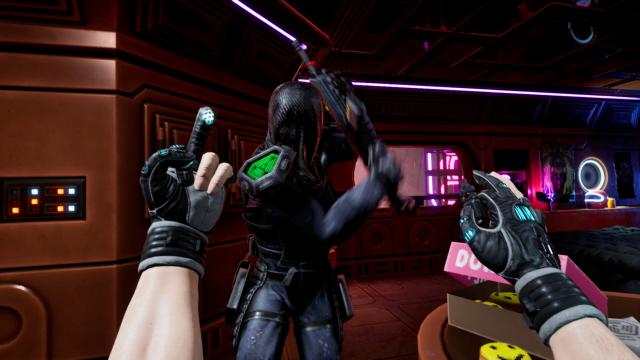
Ultimately, I come away from my return trip to Citadel Station feeling very whelmed. It’s very clear that this is a remake primarily for people who feel like the original title has aged like a fine wine (barring its older aesthetics). Unfortunately, it’s tough for me to feel that same level of appreciation. I appreciate System Shock for laying the groundwork for future immersive titles, but it definitely feels dated now, and the few changes made in the remake are a mixed bag that don’t do enough to fix its problems, while also adding new ones of their own. If you’re looking for a chance to experience a significant portion of gaming history, or are part of the group that feels the general design of System Shock has aged well, then this is likely worth a serious look. For anyone else, consider waiting for a sale or skipping it altogether.
You will probably like System Shock if: You think the original System Shock’s game design still holds up very well.
You might like System Shock if: You enjoy modern immersive RPG sims, like BioShock, Deus Ex: Human Revolution, or Prey.
You will probably not like System Shock if: You’re looking for a title with modern conveniences, like streamlined navigation and snappy combat.
VGChartz Verdict
6
Decent
This review is based on a digital copy of System Shock for the PC
More Articles
since we still don't have new deus ex. I guess that's a must have for every lover of the genre who never played the original one
Sounds like a very long wait for a game that changed very little. I liked the demo from several years back but apparently they changed direction under the development and I'm not really sure if it was before or after that. I'll probably still pick it up at some point tho and replay SS2 while I'm at it.
I was somewhat interested in a remake of System Shock, because I never completed the original when I downloaded it a few years ago. But there's something about the art style for this remake that's actually quite ugly imo, and on a technical level the visuals aren't the sort of upgrade I would've expected either, so I think I'll pass.
Not my kinda game
























